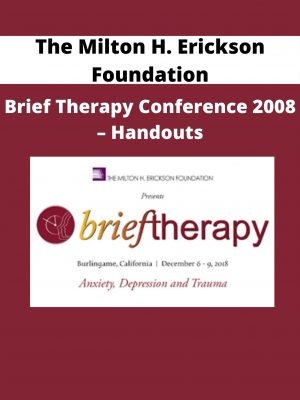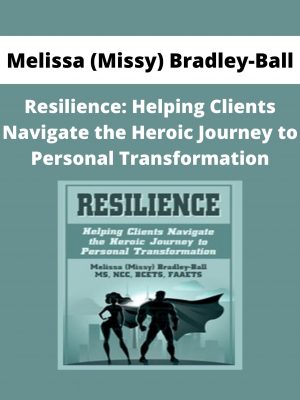Sam Alibrando – Emotionally Intelligent Psychotherapy: Integrating Power, Love, & Mindfulness
$220 Original price was: $220.$41Current price is: $41.
Shopping Instructions:
- DISCOUNT 15% : SHOP15
- Product Delivery: Within 1 – 12 hours after purchase.
Sam Alibrando – Emotionally Intelligent Psychotherapy: Integrating Power, Love, & Mindfulness
Sale Page : -/-
Description:
Finding Your Therapeutic “Sweet Spot” – A Meta-Model for All Therapists
There are three dimensions of the relational world: power, love, and mindfulness. A client’s ability to navigate these three dimensions determines how well they function in their life and relationships – and how well therapists operate from a therapeutic “sweet spot” determines their ability to help clients become more emotionally intelligent. Outcome studies confirm that the most salient predictors of therapeutic success are not related to theoretical orientation or techniques, but to the therapeutic relationship.
In this recording, Dr. Alibrando presents the Interpersonal Triangle, a meta-model developed from the work of Karen Horney and Wilfred Bion. Applications will be made to improve understanding of clients, therapist countertransference, and the change process. Working the Triangle, a practical tool, will create the dynamic balance of power, love, and mindfulness for both therapist and client, and provide therapists with a roadmap to work through impasses with challenging clients. You will take the Interpersonal Triangle Inventory to identify your therapeutic “sweet spot” with any client at any given time. This recording provides tools to transform the therapeutic process regardless of therapist theoretical orientation or level of experience.
Handouts
| Manual – Emotionally Intelligent Psychotherapy (1.87 MB) | 44 Pages | Available after Purchase |
Outline
Interpersonal Triangle Inventory (ITI)
- Complete the inventory based on a challenging client
The Interpersonal Triangle
- Three dimensions
- Power, love, and mindfulness
- Theoretical basis
- Karen Horney
- Wilfred Bion
- Elias Porter
- Anecdotal/cultural basis
- Essence of each movement
- Against/power/red
- Toward/love/blue
- Away/mindfulness/yellow
- Exercise #1: Using the ITI
Working the Triangle
- The relationship circle
- Three ways organisms protect themselves
- Three negative reactions
- Emotional intelligence and optimal human functioning
- Three ways organisms protect themselves
- Empirical support
- Neurobiological support
- The ACT of Working the Triangle
- Acknowledge the imbalance
- Consider the missing movement
- Try on the missing movement
Therapeutic Implications
- Client
- The true culprit: Anxiety-driven reactivity, implicit/emotional memories, and the limbic system
- Psychopathology
- Aggressors (red): Narcissism
- Appeasers (blue): Dependent personality and depression
- Purples (red + blue): Borderline personality
- Avoidant (yellow): Schizoid, detached
- Greens (blue & yellow): Passive-aggressive
- How to use “Working the Triangle” with our challenging clients
- Case examples
- Exercise #2: Small group application
- Therapist
- Six types of countertransference reactions
- Theoretical orientation and The Interpersonal Triangle
- Exercise #3: Finding your therapeutic “sweet spot”
- Helping relationship
- The true cure: A healthy therapeutic relationship
- Outcome studies
- Projective identification (re-enactments) as a dynamic tool
- Clinical and coaching examples
- The true cure: A healthy therapeutic relationship
Case Studies & Role-Playing
- Analysis of a challenging case
- Group exercise: Dyads and triads
- Large group case reviews
- Role-playing
Applications
- Exercise #4: Rapid review…
- “One thing you do not want to forget?”
- Call to action: Identify at least one thing you will apply next week
Faculty
Sam Alibrando, PhD,Related seminars and products:1
Sam Alibrando, PhD, is a Clinical Psychologist with nearly 35 years of experience. He specializes in intensive depth therapy (based on Object-Relations, Relational-Psychoanalytic, Systems Theory, Neurobiology, and CBT) for individuals, addiction therapy, couple therapy, parenting consultations, divorce recovery, and business-work coaching.
Dr. Alibrando received his Bachelor’s degree from Rutgers University, and his Doctorate from the Rosemead School of Psychology. He served as President of the San Gabriel Valley Psychological Association and liaison in government affairs to the California Psychological Association. He served as Director of the Relationship Counseling Clinic and the Fuller Psychological & Family Services, two training and services organizations, and has been an Adjunct Professor at Fuller’s Graduate School of Psychology. Currently he is an assistant professor at the Chicago School of Professional Psychology-Los Angeles campus where he teaches Executive Coaching.
He is also a member of the Psychologically Healthy Workplace Awards committee of the California Psychological Association. Dr. Alibrando is a respected workshop facilitator and speaker, author of Follow the Yellow Brick Road: How to Change for the Better When Life Gives You Its Worst, and has an upcoming book, Kilter: Where Power, Love and Mindfulness Meet. These books are the culmination of many years of work on how people change and the introduction of the Interpersonal Triangle.
Speaker Disclosures:
Financial: Sam Alibrando is an assistant professor at the Chicago School of Professional Psychology – Los Angeles. He receives a speaking honorarium from PESI, Inc.
Non-financial: Sam Alibrando is a member of the California Psychological Association.
Please kindly contact us if you need proof of item.Find out more Personal Development Courses at here !!!
1 review for Sam Alibrando – Emotionally Intelligent Psychotherapy: Integrating Power, Love, & Mindfulness
Add a review Cancel reply
Related products
HEALTH & MEDICAL
HEALTH & MEDICAL
HEALTH & MEDICAL
Gaia—Creating-High-Voltage-Health-with-Glenn-Streeter-Open-Minds
HEALTH & MEDICAL
HEALTH & MEDICAL
HEALTH & MEDICAL
HEALTH & MEDICAL
KettleWorX – 8 Week Rapid Evolution Advanced Set with Alex Isaly












Teagan Roob –
Very good service, but I did not like the CD’s | Sam Alibrando – Emotionally Intelligent Psychotherapy: Integrating Power, Love, & Mindfulness